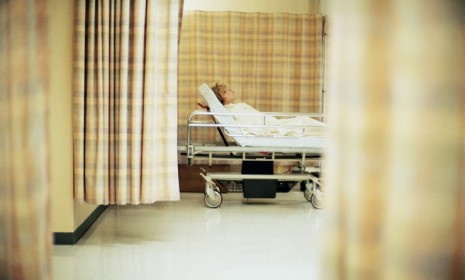The 'permanent patients' in America's hospitals
Urban health-care facilities sometimes wind up caring for people for years after they have recovered — because no one else will take them in

A free daily email with the biggest news stories of the day – and the best features from TheWeek.com
You are now subscribed
Your newsletter sign-up was successful
Hospitals in big cities are getting stuck caring for "permanent patients" who are well enough to be released, but have nowhere else to go, according to The New York Times. In some cases, these patients wind up staying for years, costing hospitals a fortune. Here, a guide to what these "decidedly unwelcome patients" mean for the nation's health-care system:
How big is this problem?
There are an estimated 300 such patients in New York City hospitals alone, and many of the nation's largest urban centers face similar quandaries. It might not sound like a huge drain on the system, but the cost of caring for a single person languishing unnecessarily in a hospital can exceed $100,000 a year. And some of these patients wind up staying as long as five years. "It cost us several million dollars a year," New York Downtown Hospital's former chief medical officer, Dr. Warren B. Licht, tells The New York Times, "in a hospital struggling to keep its head above water."
The Week
Escape your echo chamber. Get the facts behind the news, plus analysis from multiple perspectives.

Sign up for The Week's Free Newsletters
From our morning news briefing to a weekly Good News Newsletter, get the best of The Week delivered directly to your inbox.
From our morning news briefing to a weekly Good News Newsletter, get the best of The Week delivered directly to your inbox.
Who are these patients?
Some are poor, or uninsured. Others are illegal immigrants, whose families and home countries won't take them in. They often enter the hospitals for emergency care, which Medicaid frequently pays for. But once the immediate crisis has passed, the coverage stops, and hospitals are stuck with the resulting bill.
Why don't hospitals just kick out "permanent patients"?
They're not allowed to discharge people who still need some measure of care — even if it's not directly related to illness — but have no adequate place to go. Under New York law, for example, hospitals can't discharge patients to shelters or to the street. So acute-care facilities like New York Downtown Hospital can wind up keeping patients for years after they could safely be transferred to far less expensive health-care centers, or simply sent home.
A free daily email with the biggest news stories of the day – and the best features from TheWeek.com
Sources: Boston Globe, New York Times, Newser
-
 The billionaires’ wealth tax: a catastrophe for California?
The billionaires’ wealth tax: a catastrophe for California?Talking Point Peter Thiel and Larry Page preparing to change state residency
-
 Bari Weiss’ ‘60 Minutes’ scandal is about more than one report
Bari Weiss’ ‘60 Minutes’ scandal is about more than one reportIN THE SPOTLIGHT By blocking an approved segment on a controversial prison holding US deportees in El Salvador, the editor-in-chief of CBS News has become the main story
-
 Has Zohran Mamdani shown the Democrats how to win again?
Has Zohran Mamdani shown the Democrats how to win again?Today’s Big Question New York City mayoral election touted as victory for left-wing populists but moderate centrist wins elsewhere present more complex path for Democratic Party
-
 Millions turn out for anti-Trump ‘No Kings’ rallies
Millions turn out for anti-Trump ‘No Kings’ ralliesSpeed Read An estimated 7 million people participated, 2 million more than at the first ‘No Kings’ protest in June
-
 Ghislaine Maxwell: angling for a Trump pardon
Ghislaine Maxwell: angling for a Trump pardonTalking Point Convicted sex trafficker's testimony could shed new light on president's links to Jeffrey Epstein
-
 The last words and final moments of 40 presidents
The last words and final moments of 40 presidentsThe Explainer Some are eloquent quotes worthy of the holders of the highest office in the nation, and others... aren't
-
 The JFK files: the truth at last?
The JFK files: the truth at last?In The Spotlight More than 64,000 previously classified documents relating the 1963 assassination of John F. Kennedy have been released by the Trump administration
-
 'Seriously, not literally': how should the world take Donald Trump?
'Seriously, not literally': how should the world take Donald Trump?Today's big question White House rhetoric and reality look likely to become increasingly blurred


